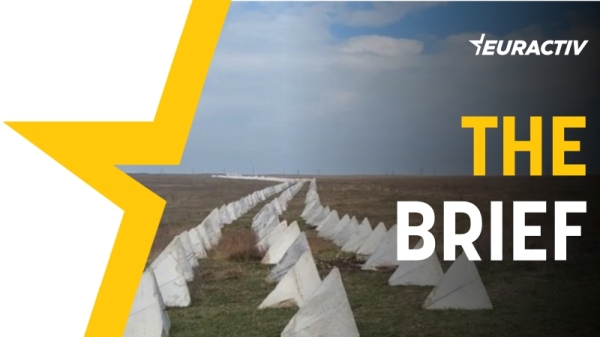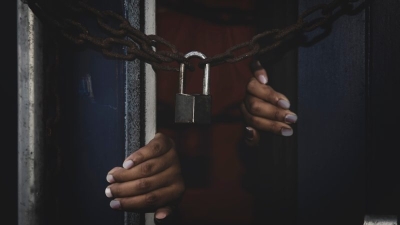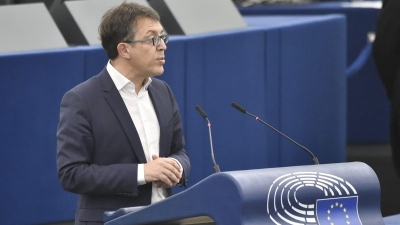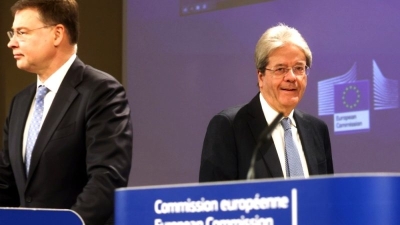The Brief — If the war was a book

If the war in Ukraine was a book, we could be approaching the showdown stage, followed, hopefully, by an epilogue. The showdown, of course, is the Ukrainian offensive, expected anytime.
Over the last months, the frontlines were frozen, with the notable exception of Bakhmut, where, in contrast, intensive fighting took place over a sliver of space of seven square kilometres.
Russia used this time to bring 200.000 additional troops and build fortifications on the contact line of territories it holds in the regions of Kherson, Zaporizhzhia, Donetsk, and Luhansk, in particular by planting “dragon teeth”, concrete pyramids intended to be an obstacle for tanks.
Ukraine also used this time to gather armament from the West, including tanks, and to train its forces.
It also conducted operations to psychologically destabilise the enemy, including drone attacks on Russian territory. Russia suddenly discovered that the frontline wasn’t 1,000 but 1,600 kilometres, including the poorly guarded border with Russia proper.
To date, the psychological advantage is with Ukraine, as Russia is busy trying to guess where exactly the Ukrainian offensive will hit.
But Russia should not be underestimated, as it had a long time to prepare, its intelligence is working, and it reportedly succeeded in destroying some of the stocks of Western armament on Ukrainian territory.
Whenever Ukraine dealt a blow to Russia – be it the attack on the Kerch bridge or drone attacks – Moscow retaliated with a hail of missiles or drones at Kyiv. Most of them were intercepted by the Ukrainian air defence, but as a result, both sides were depleted of projectiles.
The war in Ukraine made the West realise that it had no sufficient ammunition to fight a conventional war, and this is why the Commission launched an initiative to boost production.
Russia, in turn, relies on its reserves, which are not infinite, while Western sanctions and internal misgovernance prevent it from securing fresh production.
Right now, it is unrealistic to imagine a diplomatic end to the war because both sides believe in victory.
If the Ukrainian offensive leads to liberating the occupied territories, it is possible to imagine a collapse of the Russian army. That, of course, could be the end of the war.
But if the Ukrainian offensive would lead to the kind of conflict we have seen in Bakhmut, only on a bigger scale, that would be a bigger risk for the peace in the world.
Ukraine is a democratic country, it cannot accept a massive death toll over many years.
And at some point, the Russian army will exhaust its conventional weapons capacities and be tempted to use tactical nuclear weapons.
The rationale is very simple: As the conventional arsenals are melting down, the nuclear threshold is getting closer. A protracted war will inevitably become nuclear.
If this happens, the US has warned that without resorting to nuclear weapons, it will inflict a major conventional blow to the Russian army, for example, by sinking its entire Black Sea fleet.
From this moment, the nuclear holocaust could happen anytime.
The Ukrainian offensive is thus the decisive point.
If the offensive starts in July, by September it should be abundantly clear which scenario prevails.
In both cases, the international community should do its utmost to end the war.
And even in the worst scenario, as soon as peace is restored, Ukraine should become a member of NATO to shield itself from another Russian attack in the future.
The Roundup
EU lawmakers doubled down on their criticism of Hungary on Thursday, backing a motion that threatens to use blocking tactics to disrupt Hungary’s EU presidency next year.
Ukraine’s President Volodymyr Zelenskyy upped the pressure on Western allies on Thursday (1 June) as the debate about what form of potential ‘security guarantees’ for Kyiv could take gained traction.
Russia’s Federal Security Service (FSB) said on Thursday it had uncovered a US National Security Agency (NSA) plot using previously unknown malware to access specially made so-called backdoor vulnerabilities in Apple phones.
Farmers and green groups both turned out in force outside the European Parliament on Thursday over the EU’s proposed nature restoration law as tensions continued to mount over the future shape of the EU’s green ambitions.
A powder made of yellow mealworms could be the next insect-based foodstuff to hit EU supermarket shelves after winning the approval of the European Food Safety Authority (EFSA), which concluded it raised no safety concerns.
The European Parliament endorsed on Thursday a report on countering foreign interference and information manipulation, calling for a whole-of-society approach to tackling the issue.
Finland became the 31st member of NATO at the beginning of April, after a year-long accession process motivated by the threat Russia posed to European security in starting a war against its neighbour Ukraine, but “the whole process will take time,” one NATO diplomat told EURACTIV.
Internal Market Commissioner Thierry Breton renewed his call for a broad European Sovereignty Fund to finance companies in strategic sectors, and help buy specific firms of “systemic importance” at a French parliamentary hearing on Thursday.
Despite last-minute pushback against key parts of the text, EU lawmakers adopted a common position on the proposed EU rules to make companies accountable for human rights and environmental violations along their value chains, opening the way for negotiations with member states.
EU scientists are exploring how electric cars and smart grids across Europe can better communicate, in a bid to prevent power outages caused by millions of vehicles charging simultaneously.
The first auction to support green hydrogen production in Europe will help understand supply and demand on the emerging EU market when it takes place at the end of the year, according to the European Commission.
Last but not least, check out this week’s EU Politics Decoded: Unintended victims of Europe’s war on disinformation.
Look out for…
- Vice-President Margaritis Schinas delivers keynote speech at plenary session of Business Europe Council of Presidents in Madrid on Friday.
- Commissioner Janez Lenarčič participates in exchange of views with EU Executive Directors of World Bank on Friday.
- Transport, Telecommunications and Energy Council on Friday.
- European Commissioner for Equality Helena Dalli delivers keynote speech at State of the Union on Friday.



